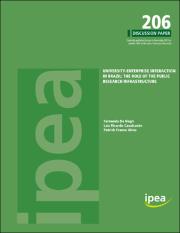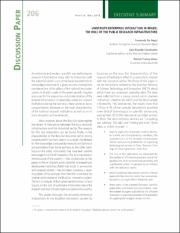Please use this identifier to cite or link to this item:
https://repositorio.ipea.gov.br/handle/11058/4951Full metadata record
| DC Field | Value | Language |
|---|---|---|
| dc.contributor.author | De Negri, Fernanda | - |
| dc.contributor.author | Cavalcante, Luiz Ricardo | - |
| dc.contributor.author | Alves, Patrick Franco | - |
| dc.contributor.other | Schmidt, Flavia de Holanda | - |
| dc.contributor.other | Nascimento, Paulo Augusto Meyer M. | - |
| dc.coverage.spatial | Brasil | pt_BR |
| dc.date.accessioned | 2015-10-28T16:44:17Z | - |
| dc.date.available | 2015-10-28T16:44:17Z | - |
| dc.date.issued | 2015-05 | - |
| dc.identifier.uri | http://repositorio.ipea.gov.br/handle/11058/4951 | - |
| dc.description.abstract | Neste trabalho, discutem-se as relações universidade-empresa no sistema brasileiro de inovação, buscando analisar as características da infraestrutura de pesquisa que afetam sua propensão a interagir com o setor produtivo. Com base em regressões logísticas, procuram-se identificar, em um amplo conjunto de variáveis explicativas, as características da infraestrutura de pesquisa que aumentam sua probabilidade de prestação de serviços às empresas. Empregam-se, além dos dados primários coletados em um survey aplicado a uma amostra de instituições vinculadas ao Ministério da Ciência Tecnologia e Inovação (MCTI), dados relativos à produção científica dos pesquisadores disponíveis na plataforma Lattes do Conselho Nacional de Desenvolvimento Científico e Tecnológico (CNPq) e a sua produção tecnológica disponíveis no Instituto Nacional da Propriedade Industrial (INPI). A escolha das variáveis explicativas ampara-se em uma breve revisão da literatura sobre o papel da infraestrutura de pesquisa nos sistemas de inovação. Esta revisão contempla ainda um breve histórico da interação recente entre a infraestrutura de pesquisa e o setor produtivo no Brasil com o propósito de amparar a discussão dos resultados obtidos. As principais conclusões do trabalho são: i) o porte do laboratório – medido pelo número de pesquisadores filiados – e a qualificação de sua equipe de pesquisa afetam de maneira positiva e significante sua probabilidade de interagir com o setor produtivo; ii) laboratórios multidisciplinares tendem a interagir mais que laboratórios concentrados em uma única área de conhecimento; e iii) parece haver um tradeoff entre produção científica e pesquisa orientada para o mercado, uma vez que o número de artigos científicos publicados pelos pesquisadores que pertencem aos laboratórios é negativamente correlacionado com a probabilidade de prestar serviços às empresas. | pt_BR |
| dc.language.iso | en-US | pt_BR |
| dc.publisher | Instituto de Pesquisa Econômica Aplicada (Ipea) | pt_BR |
| dc.title | University-enterprise interaction in Brazil : the role of the public research infrastructure | pt_BR |
| dc.title.alternative | Discussion Paper 206 : University-enterprise interaction in Brazil : the role of the public research infrastructure | pt_BR |
| dc.title.alternative | Relações universidade-empresa no Brasil : o papel da infraestrutura pública de pesquisa | pt_BR |
| dc.type | Discussion Paper | pt_BR |
| dc.rights.holder | Instituto de Pesquisa Econômica Aplicada (Ipea) | pt_BR |
| dc.source.urlsource | http://www.ipea.gov.br | pt_BR |
| dc.location.country | BR | pt_BR |
| dc.description.physical | 34 p. | pt_BR |
| dc.rights.license | Reproduction of this text and the data it contains is allowed as long as the source is cited. Reproductions for commercial purposes are prohibited. | pt_BR |
| dc.subject.keyword | Interação universidade-empresa | pt_BR |
| dc.subject.keyword | Produção científica | pt_BR |
| dc.subject.keyword | Sistemas de inovação | pt_BR |
| dc.subject.keyword | Infraestrutura de pesquisa | pt_BR |
| dc.relation.references | http://repositorio.ipea.gov.br/handle/11058/2338 | pt_BR |
| ipea.description.objective | Discutir as relações universidade-empresa no sistema brasileiro de inovação, e analisar as características da infraestrutura de pesquisa que afetam sua propensão a interagir com o setor produtivo. | pt_BR |
| ipea.description.additionalinformation | Série monográfica: Discussion Paper ; 206 | pt_BR |
| ipea.description.additionalinformation | Possui referências bibliográficas | pt_BR |
| ipea.description.additionalinformation | Possui sumário executivo | pt_BR |
| ipea.description.additionalinformation | Série: Originally published by Ipea in November 2013 as number 1901 of the series Texto para Discussão | pt_BR |
| ipea.access.type | Acesso Aberto | pt_BR |
| ipea.rights.type | Licença Comum | pt_BR |
| ipea.englishdescription.abstract | This paper discusses the university-enterprise interactions in the Brazilian innovation system by focusing on the characteristics of the public research infrastructure which affects its propensity to interact with the industrial sector. Logistic regressions have been used to identify, in a wide set of explanatory variables, the characteristics of the research infrastructure which increase its probability of supplying technological services to firms. Besides the primary data collected from a survey carried out in a sample of institutions related to the Brazilian Ministry of Science, Technology and Innovation (MCTI), data concerning the scientific and technological production of the researchers affiliated to each laboratory have also been used in the regressions. The choice of the explanatory variables was based in a brief literature review on the role of the research infrastructure in the national innovation systems. Aiming at supporting the discussion of the results of the regressions, this review also included a brief report of the recent interactions between the research infrastructure and the industrial sector in Brazil. The main findings of the logistic regressions are: i) the size of the laboratory (as measured by the number of affiliated researchers) and of the qualification of its research team positively and significantly affects its propensity to interact with the industrial sector; ii) multidisciplinary laboratories tend to interact more with the industrial sector than laboratories focused on a single field of expertise; iii) there seems to be a tradeoff between scientific publications and market oriented research, since the number of papers published by the affiliated researchers is negatively correlated to the probability of supplying technological services to firms. | pt_BR |
| ipea.researchfields | N/A | pt_BR |
| ipea.classification | Ciência. Pesquisa. Metodologia. Análise Estatística | pt_BR |
| ipea.classification | Pequenas, Médias e Grandes Empresas | pt_BR |
| ipea.classification | Tecnologia. Inovação. Informação. Conhecimento | pt_BR |
| Appears in Collections: | Ciência. Pesquisa. Metodologia. Análise Estatística: Livros | |
Files in This Item:
| File | Description | Size | Format | |
|---|---|---|---|---|
| DiscussionPaper_206.pdf | 397.25 kB | Adobe PDF |  View/Open | |
| DiscussionPaper_206_sumex.pdf | 77.15 kB | Adobe PDF |  View/Open |
Items in DSpace are protected by copyright, with all rights reserved, unless otherwise indicated.

